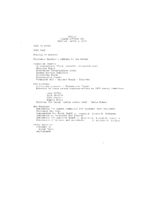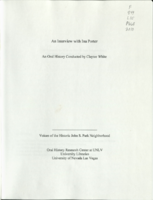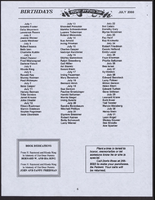Search the Special Collections and Archives Portal
Search Results

Meeting minutes for Consolidated Student Senate, University of Nevada, Las Vegas, March 5, 1974
Date
Archival Collection
Description
Text

Mike Meade interview, February 28, 1977: transcript
Date
Archival Collection
Description
On February 28, 1977, collector Steve Gortz interviewed Mike Meade (b. September 16, 1950 in San Francisco, California) about his life in Nevada. Meade speaks about growing up in Tonopah, Nevada before its decline in population, his move to Elko, Nevada and eventually to the city of Las Vegas. Moreover, he talks about the development of the Strip, the differences between Las Vegas and rural Nevada, as well as the changing environmental landscape. Meade also spends time discussing the controversy surrounding the University of Nevada, Las Vegas (UNLV) dormitory at the time of this interview, the attitude of locals, and his opinion on brothels and prostitution. Lastly, Meade talks about the city’s pollution, the sports and recreation throughout the whole of the state and ends by reading a poem about Nevada from a Bicentennial book.
Text

Transcript of interview with Marie Jordan by Danny Budak, March 20, 1978
Date
Archival Collection
Description
On March 20, 1978, collector Danny Budak interviewed the University of Nevada Las Vegas (UNLV) bookstore buyer, Marie Jordan (born June 26th, 1940 in Arizona) in the UNLV library. This interview offers Marie Jordan’s personal perspective of life in Nevada, being a local resident for twenty years. Marie also discusses family life and changes that she has witnessed in the Valley.
Text

Wilma Cooper interview, February 27, 1977: transcript
Date
Archival Collection
Description
On February 27, 1977, collector Sara Finklea interviewed housekeeper, Wilma Cooper (born December 19th, 1913 in Rock Springs, South Wyoming) in her home in Boulder City, Nevada. This interview covers Boulder City and Henderson.
Text

Transcript of interview with Helen H. Holmes by Marilyn Swanson, February 12, 1975
Date
Archival Collection
Description
On February 12, 1975, collector Marilyn Swanson interviewed housewife, Mrs. Helen H. Holmes (born Helen Hanson on February 24th, 1906, in Harrison, Nebraska) in her home in Boulder City, Nevada. This interview covers the social, economic, and environmental changes that occurred in Boulder City from 1931 to 1975. Mrs. Holmes also discusses home and family life in Nevada.
Text

Transcript of interview with Ina Porter by Claytee White, January 5, 2010
Date
Archival Collection
Description
Ina Porter recalls the story of choosing to move to the John S. Park Neighborhood in the 1940s. She and her husband Burdell were accustom to paying cash for everything and needed to establish credit with Sears to purchase their $5000 home, which was not considered inexpensive. They were among the earlier homeowners and soon the neighborhood grew to include a Mormon Church that would become so integral to the Porter family's life and to the John S. Park community. Ina was born 1917 in the small southern Utah town of Kanab. She describes her youth and speaks of the Great Depression. Ina graduated from high school in 1935, married in 1936 and moved to Las Vegas, where there were jobs for her husband. Finding work after his graduation from college was not easy, but because he had been a bus driver he was able to secure a position driving a bus for the Union Pacific Railroad and later Greyhound Bus Line. Years later Ina, Burdell and their family were part of the fiber of the Joh
Text

Jeanettee L. Del Rosario oral history interview: transcript
Date
Archival Collection
Description
Oral history interview with Jeanettee L. Del Rosario conducted by Alessandra Del Rosario on December 6, 2021 for Reflections: The Las Vegas Asian American and Pacific Islander Oral History Project. Jeanettee Del Rosario talks about her family life with nine siblings and her upbringing in Urdaneta City, Pangasinan province, Philippines. She shares her educational background in hotel and restaurant management and, after immigrating to Las Vegas, Nevada in 2006, the different hotel positions she has held in the city. Jeanettee Del Rosario discusses the process of immigration, language barriers, and missing her family in the Philippines. She also talks about Filipino traditions of respect, barangay fiestas, cultural foods, and religion.
Text

Lisa Hank oral history interview: transcript
Date
Archival Collection
Description
Oral history interview with Lisa Hank conducted by Barbara Tabach on May 31, 2019 for the Remembering 1 October Oral History Project.
Lisa discusses her move to Las Vegas in the early 1990s from California for a job with the Las Vegas Metropolitan Police Department, and her current position as head of the Police Employee Assistance Program (PEAP). Lisa talks about the night of October 1 and the aftermath of the shooting, both in her work and personal life. She is the wife of Charles Hank III, police officer and another interviewee for the Remembering 1 October Oral History Project.
Subjects discussed include: well-being in aftermath of 1 October; PEAP preparation; healing.
Text
Karin Hilgersom (Truckee Meadows Community College) oral history interview conducted by Magdalena Martinez and Elia Del Carmen Solano-Patricio: transcript
Date
Archival Collection
Description
From the Lincy Institute "Perspectives from the COVID-19 Pandemic" Oral History Project (MS-01178) -- Education sector interviews file.
Text

